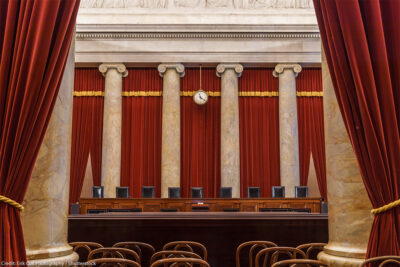
Jones v. Hendrix
What's at Stake
The issue in the case is whether federal prisoners who could not — because established law stood firmly against them — and therefore did not challenge their convictions can challenge those convictions when the Supreme Court later overrules the prior precedent upon which their convictions were based, making them legally innocent of the crime of conviction.
Summary
The ACLU and the ACLU of Arkansas filed an amicus curiae brief with the National Association of Criminal Defense Lawyers in support of federal prisoner Marcus Jones arguing that Mr. Jones must be able to present his claim that he is imprisoned based on an acknowledged misinterpretation of law.
Marcus DeAngelo Jones was convicted and sentenced to 27 years in prison for being a convicted felon in possession of a firearm in violation of federal law. In 2019, twenty years after his conviction, the Supreme Court held in Rehaif v. United States that the government must prove the defendant was aware that he was illegally in possession of a firearm. At Mr. Jones’s trial, the government made no such showing, because existing law did not require it to do so. Based on the Supreme Court’s new ruling in Rehaif, Jones argues he is serving time in prison for a crime he did not commit (because the government never showed that he knew he was illegally in possession of the gun).
The ACLU argued that keeping an individual in prison when, because of a subsequent development in the law, his conduct is not a crime raises serious constitutional questions, and the federal habeas statutes should be construed to permit Mr. Jones to pursue his claim. Federal prisoners are allowed to seek habeas relief under Section 2241 when a motion under Section 2255 “is” inadequate or ineffective to challenge the legality of his detention. Under this present-tense inquiry, it does not matter whether the prisoner might have been able to challenge the legality of his detention in the past. All that matters is whether the prisoner currently is able to raise such a challenge under Section 2255. If not, Section 2241 is available as a safety valve to ensure that the government cannot continue to imprison someone for conduct that was not a crime. Any other interpretation of Section 2255(e) would thwart the basic function of habeas corpus and raise grave questions under the Suspension Clause, the Due Process Clause, separation of powers, and the Eighth Amendment.
On June 22, 2023, the Supreme Court ruled that a man serving a criminal sentence for a crime of which he was actually innocent had no opportunity to petition the courts to be released because his previous requests for relief had been denied (before the Supreme Court made clear that his conduct was not criminal). As Justice Jackson wrote in her dissent, “forever slamming the courtroom doors to a possibly innocent person who has never had a meaningful opportunity to get a new and retroactively applicable claim for release reviewed on the merits raises serious constitutional concerns.”
Legal Documents
-
Amicus Brief of the ACLU, et al., in Support of Petitioner
Court: Supreme Court
Download DocumentPress Releases
ACLU Comment on Supreme Court’s Decision in Jones v. Hendrix
